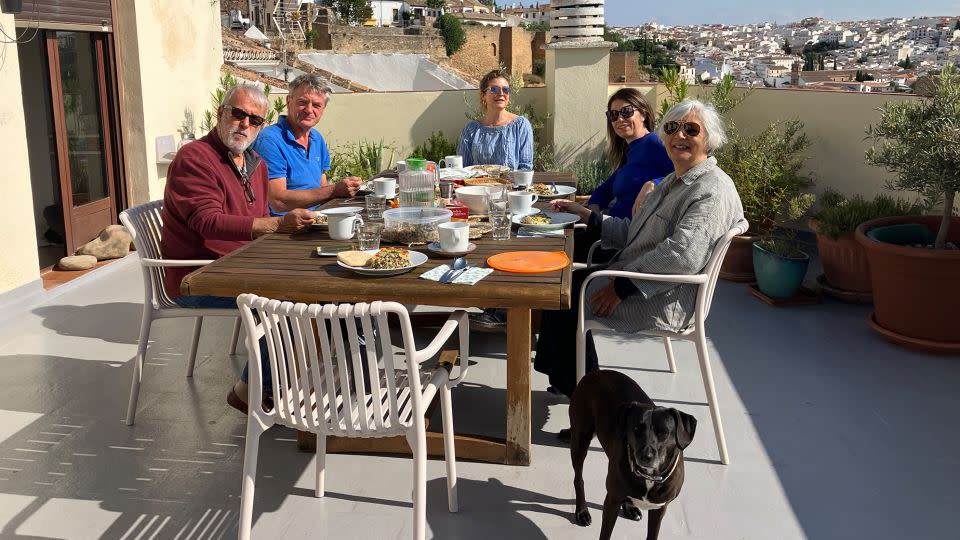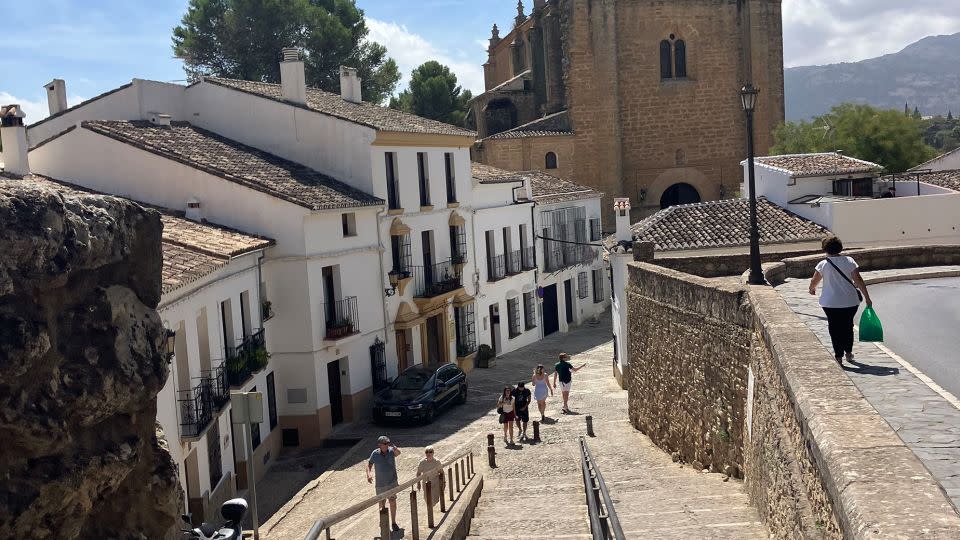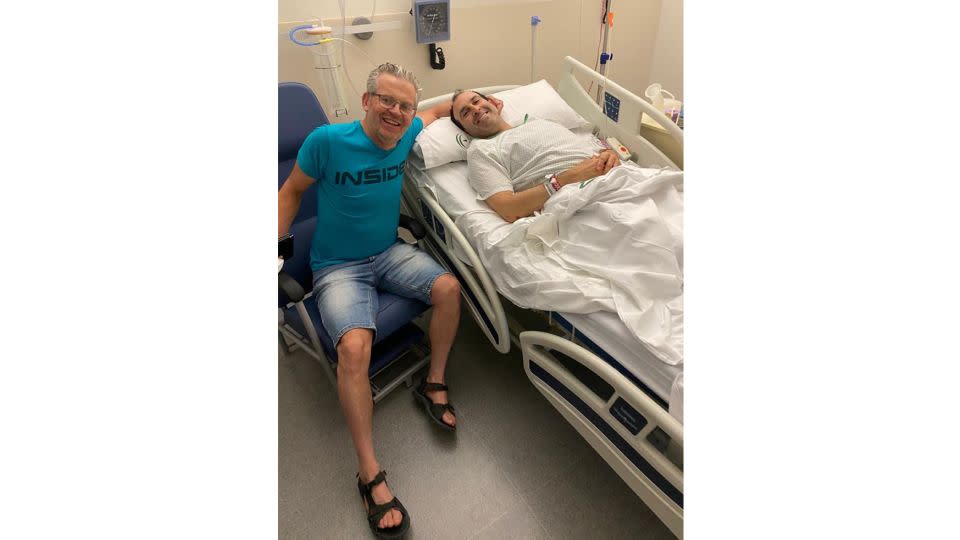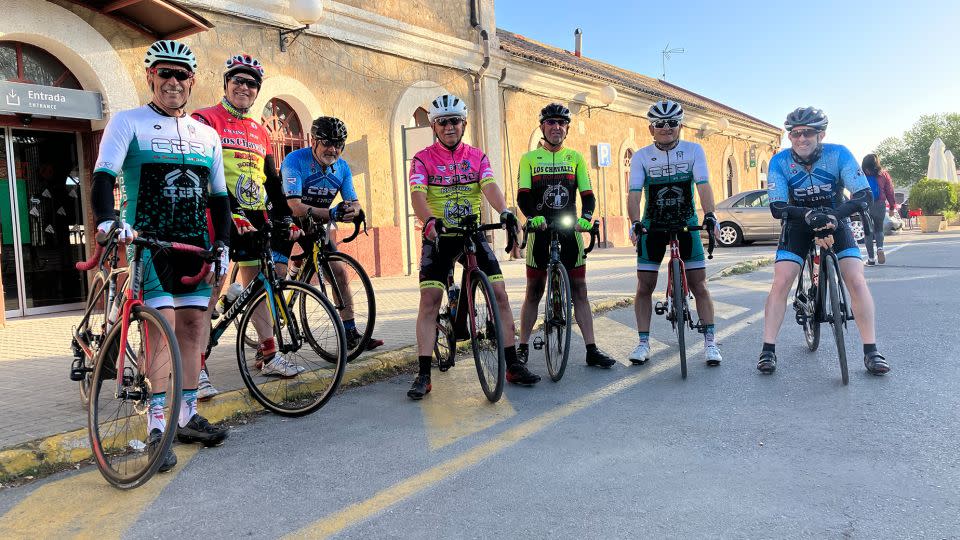After unsuccessful IVF and multiple health issues, this US couple found unexpected happiness in Spain
After a number of failed IVF rounds, health issues and the death of their beloved dog, US couple Jason Luban and Selena Medlen were in need of a change of scenery.
The couple, then based in Oakland, California, had penciled in a trip to Andalusia, Spain, months before, but were unsure whether to go ahead with it when the health of Luban, who has torsion dystonia, a rare movement disorder, began to deteriorate.
“We were figuring out how to get him healthy again,” Medlen tells CNN Travel, before explaining that Luban was also grieving the loss of a friend and mentor. “So we had this vacation on the books, and we weren’t sure if he could travel.”
According to Medlen, they ultimately decided to “go for it” after Luban, who suffers from insomnia, began sleeping better.
Spanish adventure

“We thought, maybe we needed a break,” adds Medlen, who was working as an attorney at the time. “That if we could get away from everything, maybe he would start to feel better.”
A friend had recommended that the pair, married since 2009, spend some time in Ronda, a town located in Spain’s Malaga province, so they decided to book two nights there.
But neither could have predicted that they’d end up packing up their lives and relocating there just a few months later.
In May 2016, they flew into Madrid, spending some time in the capital city, as well as Toledo, Cordoba and Seville, before heading to Ronda.
“As we left Seville for Ronda, something shifted,” says Luban, an acupuncturist. “The land. The energy. “All [of] the plants were blooming.
“There were all these colors everywhere. And we were both just in shock at how gorgeous it was as we kept climbing and climbing in the car.”
When they reached the town, they were greeted by a parade, which set the tone for the rest of the weekend.
The pair celebrated Medlen’s 38th birthday in Ronda, and say they were struck by how friendly everyone was.
“Everything kind of came together for just a day or two while we were here,” says Luban, who is originally from Oregon while Medlen is from Texas.
After wrapping up their time in the pretty town, they went on to visit Granada before returning to the US. But Ronda stayed with them.
A fabulous life

“We went back to our lives, which we realized really sucked compared to what our experience was here [in Ronda,]” admits Luban, before explaining that his insomnia returned once they were back in the US.
“Also, we both had, unbeknownst to one another, looked in the windows of real estate offices to see what the rental prices were here [in Ronda]. And it was a tenth of what we were paying in California.”
While lying on the couch one day and reflecting on their fertility struggles, they began discussing what they would want for their lives if they weren’t ever able to have children.
“Selena said, ‘If we’re not going to have a kid, I want my life to be f**king fabulous,’” recalls Luban. “And we were like, ‘Okay, what does that look like?’”
They decided that, for them, this would be having the opportunity to live in another country, experience a different culture and learn the language.
And Spain was now right at the top of their list.
After sitting down and working out the figures, the couple realized that it would be “affordable” for them to live in Ronda for a year, provided Luban sold his acupuncture practice in California, which he managed to do within six weeks.
They then whittled down all of their belongings “from two cars and a full house to two suitcases a piece,” and booked an Airbnb in Ronda to stay in before they found something more long-term.
The pair flew back to Madrid in September 2016.
Back for good?

“Four months after we left Ronda, we were back to stay,” says Luban. “For what we thought would be a year.”
But while the town had seemed like a magical place when they’d visited a few months before, it looked far less appealing when they returned shortly after Feria de Pedro Romero, a festival dedicated to bullfighting.
“We arrived on a Sunday, so it was after the party,” explains Medlen. “Everything was closed.
“The town was kind of dead and they had not had the opportunity to clean up [from the festival] yet. So it was a really different experience.”
Luban jokes that they found themselves walking down the road with their suitcases thinking, “Oh my God, what did we do to our lives?”
Although they’d previously been told that they’d have plenty of options for long-term rentals once they were in Ronda, this turned out not to be the case, and they struggled to find somewhere suitable at first.
The prices were also slightly higher than they’d estimated, although still more affordable than what they’d been paying in California.
Despite these initial setbacks, the couple persevered and soon found an apartment. They went on to join a language school in order to learn Spanish, and say that this proved to be a massive turning point for them.
“It’s probably the reason we stayed,” admits Medlen. “Because it was such a great place for forming community.”
They began going to various classes four times a week, and were able to meet other expats and discuss their experiences with them, which helped them through the process tremendously.
“Nobody in the US could relate to what we were doing,” explains Luban. “They all thought it was a great idea until we were going to do it. Then they were like, ‘What are you doing?’”
As Luban has dual US-German citizenship, he didn’t need a visa to live in Spain. However, Medlen was required to obtain a residence permit.
Welcoming community

While they adapted to the Spanish lifestyle quickly, there were some aspects that they found difficult to get used to.
“I think we struggled with the siesta concept,” admits Medlen. “We’d be gung-ho to get a bunch of things done, and we’d run into town to do those mundane tasks that we all have to do.
“But everything’s closed between two and five. So you pretty much can’t do anything.”
The pair admit that it took them some time to transition from being around expats constantly, to integrating within the Spanish community, and say that this is something that they’re still navigating.
However, Luban emotionally recalls how the importance of this connection really hit home when he ended up in hospital after a bike accident last year and underwent emergency surgery.
“It would have been a completely different and much less pleasant experience if we didn’t know people who happen to be nurses and knew the whole community,” Luban explains.
“Whereas when we first got here, we weren’t part of that community. But we thought we were having our Spain experience with expats.”
While the couple have private medical insurance, Luban was initially admitted to a public hospital, which wasn’t covered under their policy.
“Being Americans, we thought, ‘This could ruin us. There goes Spain.’” admits Luban. “The next day, when I was released after I’d had surgery, a night there, my own room and two ambulance rides. They said, ‘Well, we need you to pay the bill. It’s 1,380 euros.’”
He was particularly moved by the kindness shown by the local community, who dropped off food and constantly checked up on both of them.
“In America, people would text you gift certificates and sad faces on the phone,” says Luban.
“Here, people literally showed up at the door when Selena would be coming back from the hospital to give her a hug and tell her that they were going to be there. And they were there. For weeks.”
While they’d initially planned to stay in Spain for a year, Luban and Medlen chose to extend their stay beyond this.
The couple admit that watching Donald Trump being elected as president of the United States in November 2016 contributed to their decision to remain in Spain.
“Once that happened, within a couple of months, our families were saying, ‘Don’t come back,’” says Luban, explaining that their relatives had been eager for them to return before the election result.
“‘This country is changing. You really should just enjoy yourselves and not get caught up in all of the division that’s happening in the United States.’ That was just two months in.”
Medlen points out that they both worked constantly while they were in the US, and felt as though they rarely got to spend time together, whereas they’ve been able to enjoy each other’s company a great deal more while living in Spain.
Meanwhile, Luban’s health has improved during their time there, and he regularly rides with various local cycling groups. However, he says that he’s had his ups and downs “sleep-wise.”
“The biggest thing is that we can manage our stress much better here,” he says. “When we’re not constantly worrying about our safety, money or whatever.”
Quality of life

As they only had enough funds to cover a year living in Spain without working, the couple needed to start earning money again in order to extend their time there.
Fortunately, Medlen was able to take on remote work for law firms in the US and Luban launched a website advising other practitioners on how to sell a medical practice.
“I’d say we spend one fifth of what we would on food here, rather than California,” Luban estimates. “One eighth to one tenth on our living expenses. One eighth on health care.
“And we had no idea how much your quality of life goes up when you’re not trying to meet all of those bills.”
They both try to work around 20 hours a week, and say they’ve been able to live comfortably this way because their money goes much further in Spain.
“We also have more time to cook, which brings your food bills down because you’re not buying takeout,” adds Medlen. “And we have more time to exercise. So I feel like we’re healthier.”
Seven years after relocating to Ronda, the couple are very much settled, and even have a dog, named Lola Supernova.
They say that they re-evaluate their decision each year, and weigh up whether they want to stay in Spain or move on.
However, they’ve chosen not to buy a home there so that they have a little more freedom.
“Wa take it to one year increments,” explains Medlen. “And we still rent our apartment that we live in.
“We want to keep things simple and have flexibility so that we could change our minds and go somewhere else.”
They return to the US every year and joke that they’re always shocked by how much a burrito at American food chain Chipotle is.
“There’s been a lot of inflation since we left,” notes Medlen.
While the couple still sometimes struggle with the prospect of not having children, Luban, now 53, says they feel “too old now,” adding that while they previously looked into adoption “the process seemed to be a nightmare, financially and otherwise.”
“And it was such an emotionally (and financially) painful experience to try and fail, we couldn’t go through it again,” he adds, stressing that they have “no regrets.”
“So we decided instead that we’d make our lives as interesting as possible.”
Both acknowledge that one of the downsides of living in a different country for so long is that they don’t necessarily feel they belong anywhere.
“We may never feel entirely at home in the US again, and we will never be truly accepted as Spanish,” admits Luban, noting that a “great way to learn about your country is to leave it.”
“But Andalusia has taken us in, cared for us in a way we never could have imagined. Like interest on a bank account we never knew we had.”
For more CNN news and newsletters create an account at CNN.com


